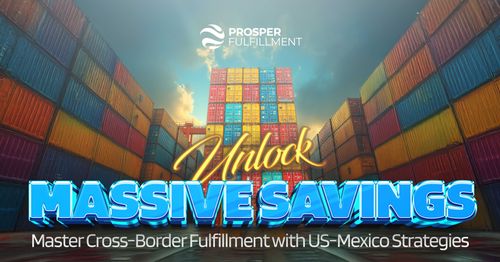Cross-Border Fulfillment: A Strategic Alternative in a Tariff-Driven Market
In an era where tariffs can significantly impact operational costs, e-commerce businesses are exploring innovative solutions to remain competitive. Cross-border fulfillment, particularly in Tijuana, Mexico, is emerging as a viable option to balance costs, delivery speed, and inventory management. Here’s a high-level overview of how cross-border strategies can help businesses navigate challenges posed by tariffs.
Cost Efficiency Through Cross-Border Operations
Rising tariffs, such as the proposed 25% on imported goods, can severely inflate costs for U.S.-based fulfillment operations. By leveraging cross-border fulfillment in Tijuana under Section 321, businesses can:
- Reduce Costs: Warehouse and labor expenses in Tijuana are significantly lower than in the U.S.
- Avoid Tariffs: Section 321 allows duty-free entry for shipments valued under $800, bypassing tariff costs for eligible goods.
This cost-saving opportunity, however, requires robust systems to segment shipments and ensure compliance with U.S. customs regulations.
👉 Ready to save on tariffs and reduce logistics costs? Book a Call to explore tailored cross-border solutions today!
Speed to Market Without Breaking the Bank
For brands emphasizing fast delivery, like those launching limited-edition product lines, Tijuana fulfillment offers competitive transit times to U.S. markets:
- Comparable Delivery Times: Tijuana-based fulfillment centers can achieve 1–3 day shipping to major U.S. hubs.
- Cost-Effective Shipping: Proximity to the U.S. lowers transit expenses while maintaining competitive product pricing.
While customs compliance adds complexity, proper planning ensures timely deliveries and cost advantages.
👉 Accelerate your e-commerce growth. Book a Call now to create a fulfillment strategy that works for your business!
Inventory Management with a Tariff Buffer
Managing inventory efficiently is critical for seasonal businesses. Cross-border fulfillment supports just-in-time strategies by:
- Reducing Holding Costs: Lower warehouse expenses in Tijuana minimize the financial impact of overstocking.
- Flexibility: Importing smaller, tariff-free batches under Section 321 offers a cost-effective buffer against fluctuating demand.
With advanced planning, businesses can align their inventory strategies with cross-border benefits to stay nimble.
👉 Is your inventory strategy ready for 2025? Book a Call to align your operations with smarter solutions!
Key Financial Benefits of Cross-Border Fulfillment
Tariff Impact:
• U.S. Fulfillment: Increases costs by 25%.
• Tijuana Fulfillment: Avoids tariffs for shipments under $800 (Section 321).
Operational Costs:
• U.S. Fulfillment: Higher labor and warehouse costs.
• Tijuana Fulfillment: Lower labor and warehouse costs.
Flexibility:
• U.S. Fulfillment: Limited due to high costs.
• Tijuana Fulfillment: High flexibility with cost-effective inventory options.
👉 Want to understand how these savings apply to your business? Book a Call with our team to dive deeper.
Why Tijuana is a Strategic Choice
Cross-border fulfillment from Tijuana provides several advantages:
- Cost Savings: Significant reductions in labor, warehouse, and tariff expenses.
- Proximity to the U.S.: Ensures fast shipping while keeping costs low.
- Scalability: Adapts to market fluctuations and high-volume demands.
👉 Looking to expand your operations efficiently? Book a Call to learn more about scaling with Tijuana fulfillment!
Conclusion: A Smarter Fulfillment Strategy
While U.S.-based fulfillment offers simplicity, the rising cost of tariffs can erode profitability. Cross-border solutions from Tijuana, under Section 321, provide a compelling alternative for businesses aiming to optimize costs, maintain delivery speeds, and stay competitive in a tariff-driven market.
👉 Let’s build a strategy together! Book a Call with our experts and unlock the full potential of cross-border fulfillment.

